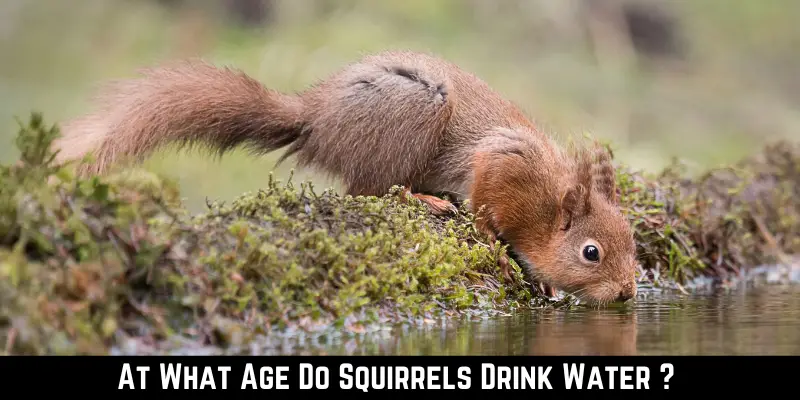Water is a life necessity for every living creature. Squirrels build their home near ample food supply and clean water sources. You might have seen squirrels and their babies hanging out in your yard while searching for food. You must have seen squirrels eat a lot of food, young or adult, but at what age do squirrels drink water?
Squirrels typically start drinking water between four to twelve weeks of age. Before that, they rely on milk for hydration. Adult squirrels have adaptable kidneys and can absorb fluids from the food they eat, reducing their need for drinking water.
Water is vital for squirrels’ life. Even during winter, it will come out of its nest in search of water. Continue reading to find more details about water’s importance in squirrels’ lives.
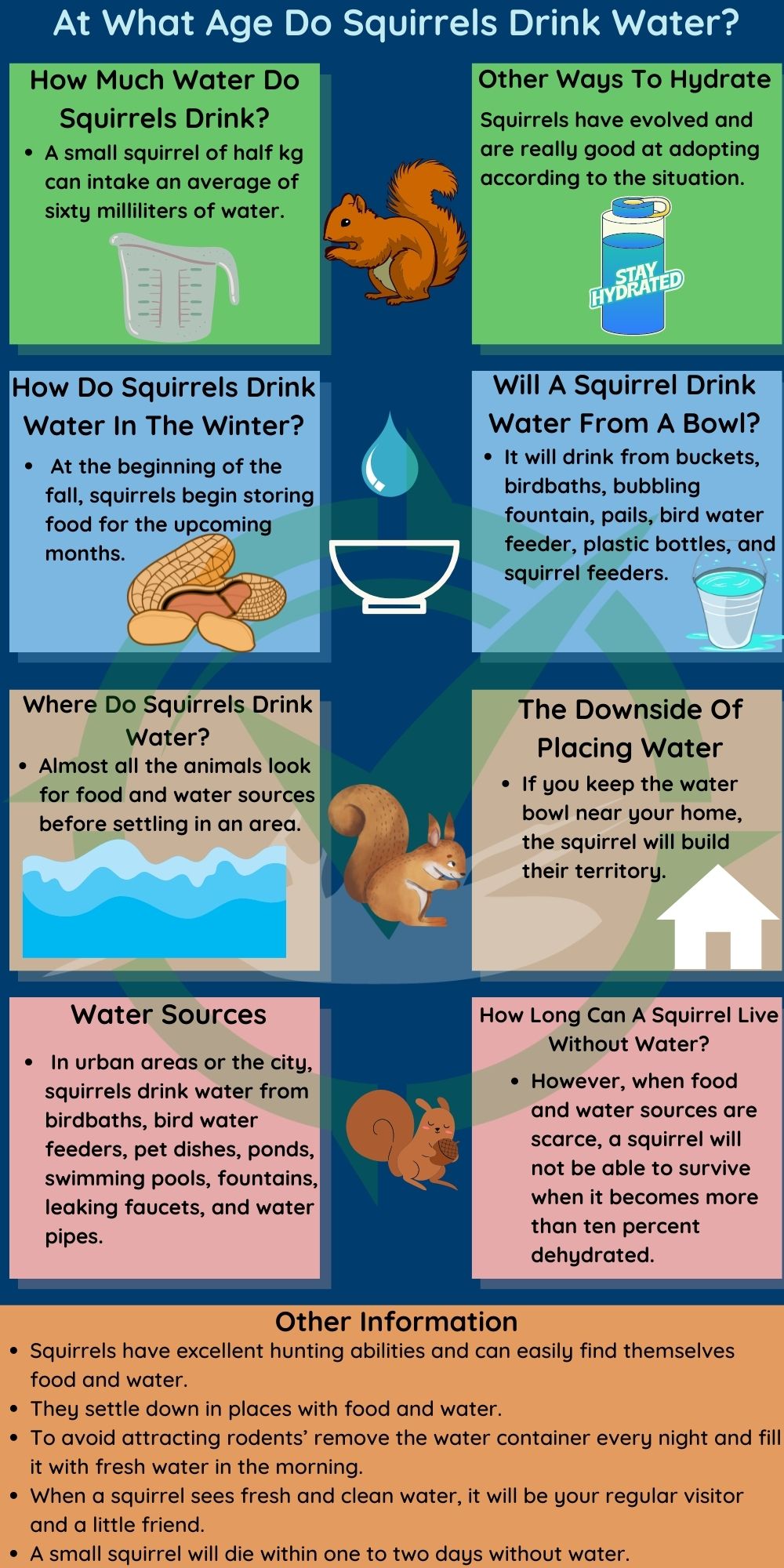
How Much Water Do Squirrels Drink Per Day?
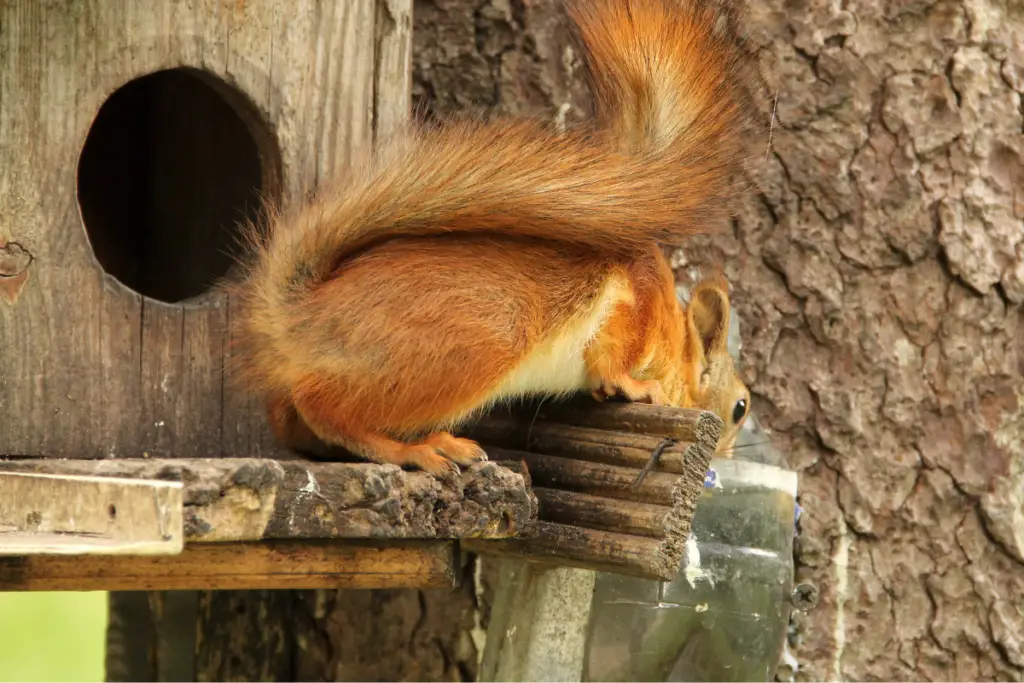
Typically, a squirrel drinks thirty to ninety milliliters of water per day. But it depends on the weight, living, and health conditions. A small squirrel of half a kg can intake an average of sixty milliliters of water. An adult squirrel that weighs more will drink about ninety milliliters of water.
Squirrels living in a dry and humid climate will need more water than squirrels living in a cold city. Plus, pregnant and nursing female squirrels are more dehydrated as they work more and eat a lot of nuts than the other female squirrels. Therefore, they will need more water about 120 to 180 ml.
Give your pet squirrel three tablespoons of water twice a day. It will be enough in a normal situation. If you live in a hot climate, increase the water accordingly. Along with time, squirrels have adjusted to find water sources and build homes nearby.
How Do Squirrels Drink Water In The Winter?
During winter, squirrels hide inside their nest and do not come out unless they are starving or dehydrated. At the beginning of the fall, squirrels begin storing food for the upcoming months so they will not have to travel long distances in search of nutrition.
But it will have to eventually come out of hiding and search for water when they are thirsty.
During winters, water bodies like lakes, ponds, and rivers freeze. Therefore, the water sources are limited, making it difficult for squirrels to stay hydrated. So, they will eat snow or lick the frozen water sources, which are easier to find and will continue to hydrate themselves through this method throughout the winter.
Squirrels living near human settlements will invade their homes in search of water.
Sandra. L. Martin states in her article on a water balance that ground squirrels begin preparing for hibernation during fall.
They gain weight and practice being mentally inactive even when the temperature is slightly warm. However, they are not in a state of torpor for the entire hibernation period.
They arise from torpor for almost twenty-four hours every few days, bringing squirrels’ body temperature back to normal.
Where Do Squirrels Drink Water?
Almost all animals look for food and water sources before settling in an area. Similarly, squirrels mark their territory in places with plenty of food and water sources. When thirsty, squirrels prefer drinking from water bodies near their nesting area and far away from the predator’s reach.
Water Sources
In the wild or nature, squirrels drink water from rivers, lakes, creeks, ponds, and streams. In urban areas or the city, squirrels drink water from birdbaths, bird water feeders, pet dishes, ponds, swimming pools, fountains, leaking faucets, and water pipes.
Squirrels can drink muddy and dirty water. When extremely dehydrated, they drink water from puddles on the roadside and even filthy water from sewers.
Other Ways To Hydrate
Squirrels have evolved and are really good at adapting according to the situation, condition, and availability of sources. They do not necessarily have to drink water, instead have different ways to hydrate themselves.
Squirrels can hydrate their body by consuming food high in water content: such as eggs, mushrooms, tree sap, watermelon, eggs, tomatoes, berries, and many other veggies and fruits. Squirrel kidneys are highly effective in absorbing water and keeping the body hydrated.
They lick the morning dew from plants and drink the water from pools after the rain. Squirrels can eat snow during winter to keep themselves hydrated.
Will A Squirrel Drink Water From A Bowl?
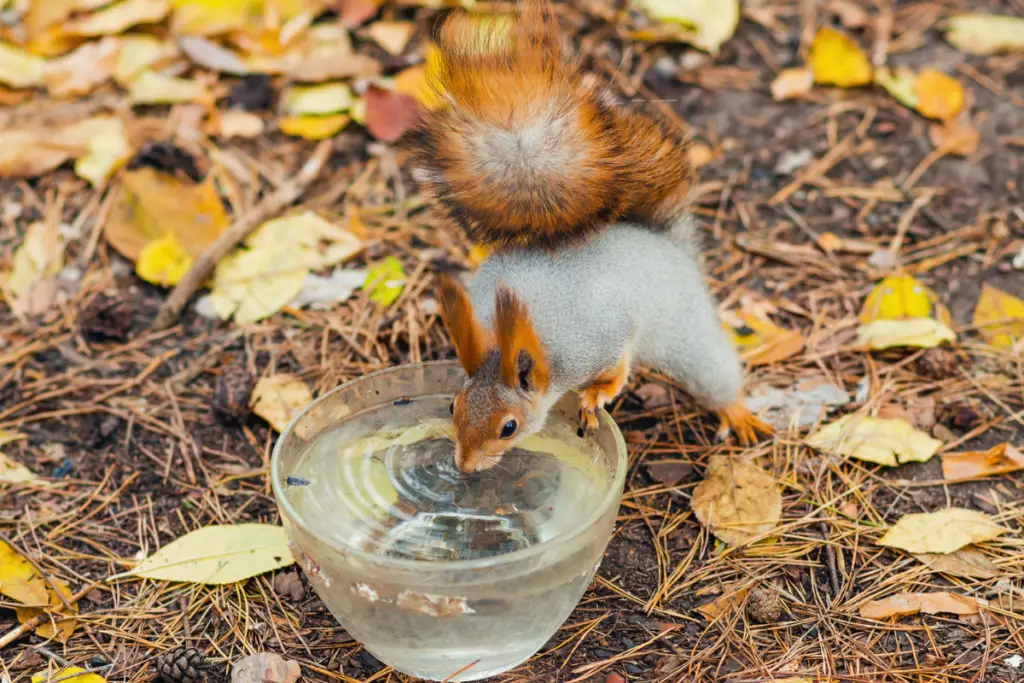
Water is vital for every life. Many people keep fresh drinking water in their yards for animals. Typically, people use buckets, birdbaths, bubbling fountains, pails, bird water feeders, plastic bottles, and squirrel feeders that also come with water dispensers.
Squirrels are wild and prefer drinking fresh water before searching for standing water bodies. However, I suggest you place a freshwater container outside when the weather is hot and dry. During summers, water sources are limited, and animals cannot travel long distances in food and water search without getting thirsty.
For squirrels’ safety, place water bowls instead of pails or buckets as small squirrels can drown in them. Ensure that you place these water bowls far from your home.
The Downside Of Placing Water
However, there are drawbacks to placing water bowls for squirrels. If you keep the water bowl near your home, the squirrel will build their territory near your house and will probably never leave. Therefore, place water bowls at a great distance from your home.
Standing water sources will attract other unwanted animals like rats, mice, and raccoons. Rodents and raccoons can cause a huge mess. They are dangerous for pet animals and other local animals. Plus, water bowls can attract mosquitoes and lead to many diseases.
Do Squirrels Drink Fresh Water?
Squirrels prefer fresh drinking water from natural running water bodies, like streams, lakes, creeks, etc. When the temperature is high, the weather is hot and dry; the squirrel will drink water from standing water sources like birdbaths, fountains, and bowls.
They drink water by putting their head down in the water source and sipping water rapidly by moving their tongues across the surface. They dip their tongue into the water, curl it to pick up water and push it back inside the mouth.
When a squirrel is very dehydrated and unable to find fresh and clean water sources, it will not be picky about the water and drinks dirty water from puddles on the sidewalk and road or even from the sewerage pipe.
How Do You Give Wild Squirrels Water?
Squirrels are cute and friendly little animals. They settle down in places with food and water. If you want to become friends with neighborhood squirrels, it is better to take care of them and provide them with fresh water, especially during hot and dry days.
The best option is to install squirrel feeders with a water dispenser. You can also use water bowls, bird feeders, and a bubbling fountain. However, ensure that the water container is not too deep like a pail or bucket because it is dangerous for small squirrels.
To avoid attracting rodents’ remove the water container every night and fill it with fresh water in the morning. It also decreases the chances of mosquitoes and the growth of algae.
Hang the water container for squirrels on the tree, preferably hidden in-branch away from the sight of predators and pests.
How Do You Get Squirrels To Drink Water?
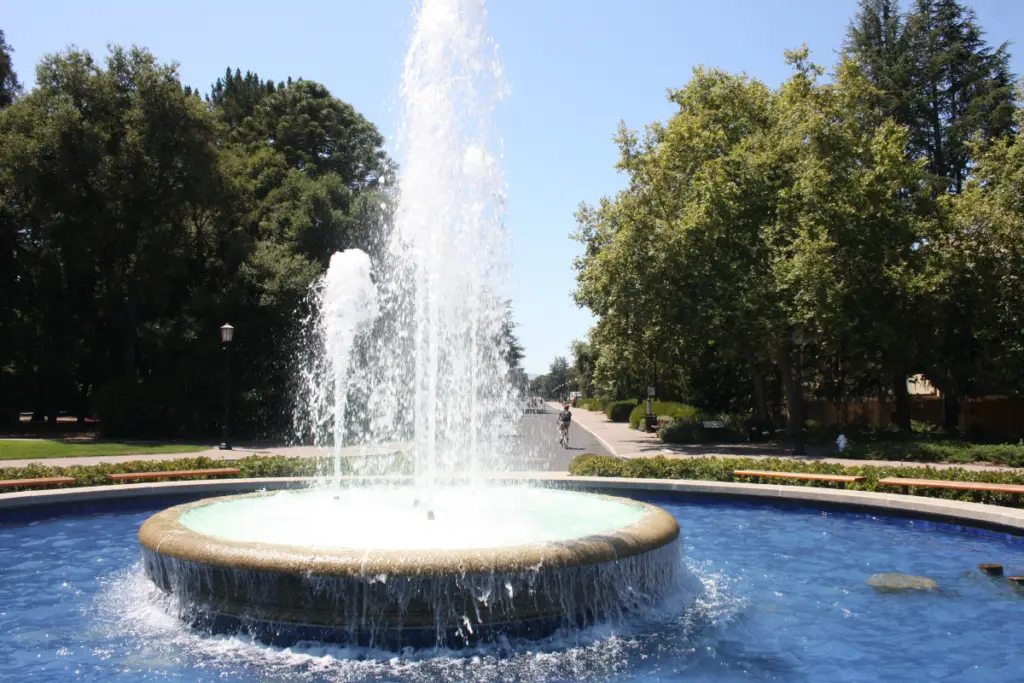
Squirrels have excellent hunting abilities and can easily find themselves food and water. It is difficult to survive without finding water sources nearby on a hot day.
In normal circumstances, squirrels prefer drinking fresh water from streams, but in urban areas, fresh water is rather hard to find. Therefore, you can help squirrels to drink water by placing water containers outside.
Place a shallow container of a few hundred ml. The water container should not be deep for the squirrels’ safety. Place the container outside in the morning and bring it back inside in the evening to prevent attracting rats.
Apart from water containers like bowls, bird feeders, and squirrel water dispensers, you can install a bubbling fountain.
When a squirrel sees fresh and clean water, it will be your regular visitor and a little friend. However, remember an adult squirrel drinks about three or four teaspoons of water per day.
How Long Can A Squirrel Live Without Water?
Just like all other living creatures, squirrels need food and water to survive and grow. They are intelligent and quick when searching for food. However, when food and water sources are scarce, a squirrel will not be able to survive when it becomes more than ten percent dehydrated.
A small squirrel will die within one to two days without water, and adult squirrels will not last more than two or three days. But it can last for five days without food.
Squirrels have adaptable kidneys that can take up even little water to hydrate the body. Therefore, they do not necessarily require drinking water. They can hydrate themselves by eating food high in water content.
Conclusion
Squirrel starts drinking water between four to twelve weeks. Before that, it relays on milk for hydration. Adult squirrels are intelligent and know all the methods to find water and food sources. They do not only rely on water for hydration. A squirrel’s kidney can absorb fluids from the food it eats.
During winter, when the water sources are limited, the squirrel can lick and eat ice for hydration. Generally, squirrels prefer drinking water from freshwater sources like lakes, creeks, rivers etc. But during a hot climate, a squirrel will need water every few hours and can drink water from standing water sources.
However, it is not recommended to place water for squirrels very close to your house as it attracts the pest and can cause destruction to your home.
References
Ni Y. Feng, Madeleine S. Junkins, Dana K. Merriman, Sviatoslav N. Bagriantsev, Elena O. Gracheva, Osmolyte Depletion, and Thirst Suppression Allow Hibernators to Survive for Months without Water, Current Biology, Volume 29, Issue 18, 2019.
